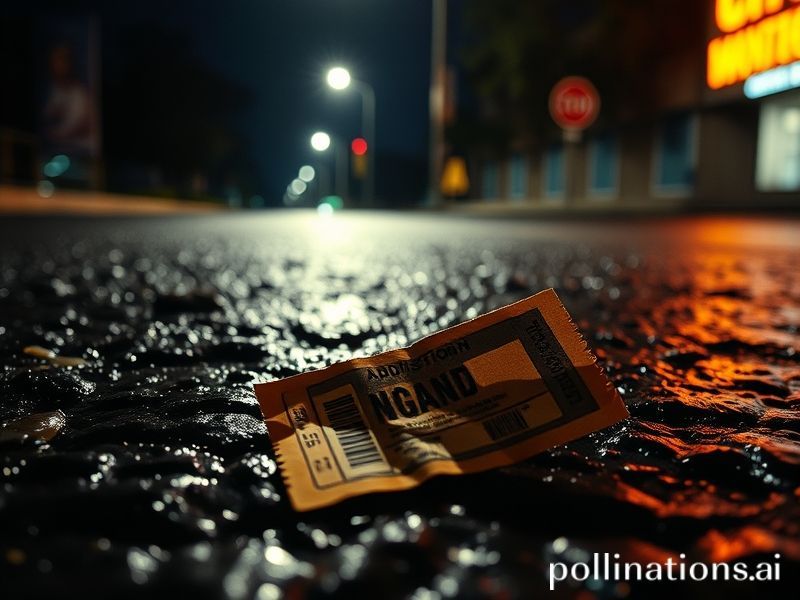Global Ticket Tyranny: The Over-Printed Passport to Everywhere You’re Not Really Welcome
The Ticket That Launched a Thousand Scams
An International Field Guide to the Most Over-Printed Scrap of Paper Since Monopoly Money
PARIS—On any given morning, the line outside the Louvre snakes like a colonoscopy camera, and every pilgrim clutches the same talisman: a crumpled ticket. The same ritual repeats in Lima, Lagos, and Lahore. From a QR-coded boarding pass on a budget airline in Jakarta to a handwritten chit for a sack of rice in Caracas, the humble ticket is humanity’s most democratic—and most abused—passport to whatever we’re told we need next.
History, of course, began with tickets: the wooden tesserae Romans flashed at the Colosseum to watch lions turn Christians into finger food; the paper chits 19th-century Britons traded for gin in workhouses. Fast-forward to 2024 and the ticket has metastasized into a thousand digital strains, each more inventive in its capacity to disappoint. In Seoul, K-pop fans camp for weeks to secure a barcode that will, on the appointed night, fail to scan because the promoter “accidentally” oversold the arena to four separate chatbots. In New York, the Metropolitan Opera sells $18 “standing room” tickets that are literally tickets to stand—no seat, no leaning, just the privilege of balancing on your own arches while a Norwegian soprano hits high C above your bankruptcy.
The global south, ever resourceful, has turned ticketing into performance art. In Nairobi, matatu conductors issue receipts repurposed from old election ballots—nothing says “public transit” like voting for a long-dead county councillor every time you ride to work. In São Paulo, favela funk parties eschew paper altogether; entry is a fist bump and the password “Bolsonaro owes me 50 reais,” which doubles as an informal credit rating. Meanwhile, in the EU, bureaucrats have spent €3.7 million and three years designing an “interoperable multimodal smart ticket” that still can’t get you from Brussels to Luxembourg without three separate apps, two passwords, and a blood oath to the GDPR.
Tickets, of course, are the perfect metaphor for late-stage capitalism: a promise sold at a premium, redeemable for an experience that will underwhelm in direct proportion to the hype. Consider the metaverse—remember that?—where people paid real money for NFT tickets to virtual concerts headlined by avatars of dead rappers. Somewhere in the blockchain, those tokens still exist, like digital tombstones commemorating the exact moment human dignity flatlined.
Airlines, those alchemists of disappointment, now auction “upgrade tickets” that guarantee nothing beyond the right to outbid your fellow sardines for three additional inches of legroom and a lukewarm carbonara that tastes of existential dread. Overbooking is simply the industry’s way of teaching stoic philosophy at 35,000 feet: you thought you had a seat, but actually you have a lesson in impermanence.
Yet the most audacious ticket scam of all may be citizenship by investment. For the low, low price of $150,000 and a pledge to pretend you like cricket, St. Kitts will FedEx you a passport faster than Amazon delivers socks. The ticket, in this case, is literal escape—from taxes, from questions, from your own countrymen who can’t afford the exit fee. It’s Willy Wonka’s golden ticket, except the chocolate factory is a condo in Dubai and Oompa-Loompas are indentured construction workers.
But perhaps the darkest joke is saved for last: the lottery ticket. Every week, from Alabama to Uttar Pradesh, humans voluntarily tax themselves for the right to fantasize about a life that statistically ends in disappointment and, occasionally, bankruptcy. Governments, ever paternal, market it as “funding education,” which is ironic because anyone who understood probability would keep the two bucks and buy a sandwich instead.
So the next time you clutch a ticket—any ticket—remember you’re holding a tiny contract with disappointment, printed on recyclable hope. Wave it at the gate, the bouncer, or the border guard, and take your place in the queue that stretches, as ever, toward the next letdown. At least the lions at the Colosseum had the decency to finish the job quickly.







